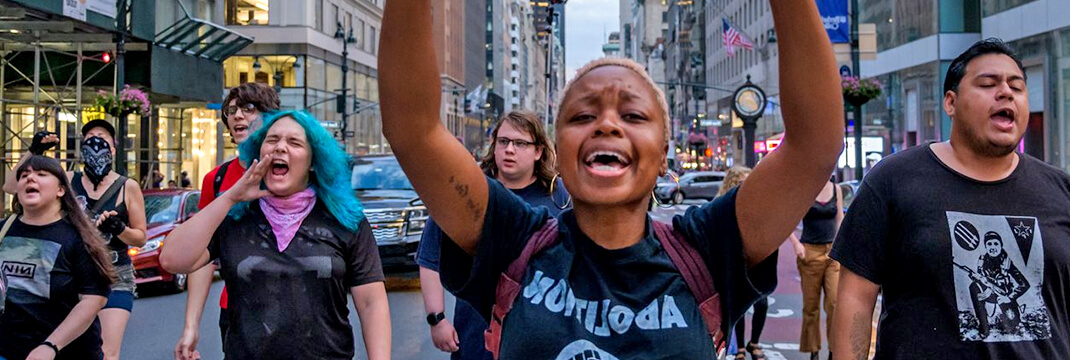
Introduction
Different protest movements had a particular importance for the political development of the United States. The occasional appearance of radical groups in America also had a great influence on the formation of its social and cultural systems. Currently, the society considers radicals to be supporters of drastic policy measures. In most cases, radicalism leads to extremism – commitment to extreme views and political activities based on a violent nature. The origins of American radicalism can be found in numerous historical events that occurred prior to the War of Independence. One of the first radical manifestations is “Boston Massacre” or the clash between the soldiers of the British army and unarmed civilians. The incident occurred on March 5, 1770, and ended with the death of five Bostonians (“The Boston massacre trials: A chronology,” n.d.). While the verdict against the British soldiers was lenient, the public resonance eventually made “Boston Massacre” one of the most significant prerequisites to the War of Independence.
Historical Background
The colonization of America occurred rapidly and by the eighteenth century the colonies grew in economic and cultural terms, and almost all of them had an experience of self-government. The continuous flow of immigrants from Europe led to the steady territorial expansion. Moreover, until the middle of the eighteenth century, the United Kingdom did not conduct any specific policy in relation to its colonial possessions. The main principle of the country was mercantilism based on the idea that colonies should supply England with raw materials and not try to compete with its industry. However, this policy was not tight enough and from time to time the British parliament tried to subordinate the economy and governments of the colonies to will and interests of England, but the subsequent steps of the British government in establishing a new colonial management system caused the powerful and organized resistance. The Stamp Act implemented on March 22, 1765, declared that any newspapers, advertisements, pamphlets, and legal documents printed by colonies should be taxed (“The Boston massacre trials: A chronology,” n.d.). Such act angered the most influential social groups such as journalists, lawyers, and merchants because the tax literally touched all social classes. While the public discontent forced the British government to repeal the Stamp Act, it introduced the Declaratory Act and The Townshend Revenue Act in the next two years (“The Boston massacre trials: A chronology,” n.d.). Such manifestations of British external policy created an extremely tense atmosphere that could easily escalate.
The Incident and Further Trials
The presence of British troops in Boston served as a constant occasion of the disorder. On March 5, 1770, after months of the tense situation in the city, the mutual hostility between the citizens and soldiers turned into a massacre. The Bostonians abused a British soldier that guarded the Common House. After he had received reinforcements, the crowd began to throw pieces of ice, oyster shells, and other objects. Someone in the ranks of the British gave the command to fire and the clash ended with five dead civilians. The trial of the eight soldiers began on November 27, 1770 (“The Boston massacre trials: A chronology,” n.d.). John Adams, who was the British lawyer, claimed that the soldiers were provoked and in danger (“Summation of John Adam,” n.d.). Considering the stressful conditions, after a long discussion the jury acquitted six soldiers. Another two soldiers, Hugh Montgomery and Matthew Killroy, were found guilty of murder. However, they achieved the commutation of the sentence by pleading “the benefit of clergy” and received the public branding on their right thumbs instead of the death penalty (“Key figures in the Boston massacre trials,” n.d.). While such decision of the jury is quite logical because the soldiers were under significant pressure, they still should not have opened fire under any circumstances. Thus, the official sentence could have been harsher.
Invite your friends and get bonus from each order they
have made!
The Significance of American History
While the sentence for the British soldiers remains a rather controversial question, one cannot deny the significance of “Boston Massacre.” In American history, it played two crucial roles. Firstly, this incident showed the ineffectiveness of British colonization policy and demonstrated the true relations between America and England. Decades before the War of Independence were marked by the tightening of British policy related to its American possessions. The adoption of a series of acts restricting the colonial trade resulted in the returning growth of colonial discontent with the actions of Britain. The colonists depicted the “Boston Massacre” in dramatic tones to prove British heartlessness and cruelty. English soldiers cowardly used the weapons against the unarmed crowd, apparently without orders. As a result, it caused a great public resonance that forced the English Parliament to begin strategic withdrawal and reverse all acts except the taxation of tea. Most of the colonists regarded such actions of parliament as a significant concession and continued the anti-British campaign. On December 16, 1773, a group of colonists led by Samuel Adams snuck aboard three English ships that were anchored in the Boston Harbor and threw bales of tea into the water (“The Boston massacre trials: A chronology,” n.d.). This incident received a title of “Boston Tea Party” and served as another step towards American independence. The colonial economy began to flourish because of the boycott of British goods, and American society saw a bright future.
Secondly, “Boston Massacre” demonstrated that America wanted freedom and was ready to struggle for it. The clash in Boston served as the perfect ground for the emergence of radicalism. American patriots printed numerous pamphlets and flyers that depicted “Boston Massacre” as the serious crime against the American people. For example, silversmith and engraver Paul Revere made a famous engraving of these events adding several provocative details to ignite more social unrest. The information on the clash given in anonymous pamphlets was absolutely different from the one presented in court. “Short Narrative of the Horrid Massacre” described the shooting and other smaller incidents that occurred a few days before the unprovoked acts of violence against peaceful citizens (“Anonymous account of the Boston massacre,” n.d.). It also claimed that Captain Preston sent his soldiers with the intent to cause harm to the civilians. Samuel Adams was one of the most active patriotic leaders whose primary goal was to achieve the independence of America (“Key figures in the Boston massacre trials,” n.d.). Adams inspired ordinary people to dignity, struggle, and fearlessness against those who held higher positions. The most effective tools of propaganda were newspaper articles, speeches, town meetings, and resolutions appealing to the democratic feelings of the colonists. Therefore, “Boston Massacre” united American nation and was a crucial step towards achieving the independence.
Conclusion
The emergence of American radicalism was not a coincidence but the inevitable result of the colonial struggle for freedom. The strict external policy of Great Britain that supposed high taxations, restricting acts, and the presence of troops in the cities, as well as public discontent, resulted in the armed clash that received a title of “Boston Massacre.” While the court sentence was extremely lenient, it started the wave of patriotic movement that eventually led to a decrease in British control. At the same time, the incident in Boston showed that the American nation could unite. While the common territory, economic and commercial interests of the colonies, language, and religion laid the foundations for a new nation, the “Boston Massacre” was one of those events that formed its character. Such events created the image of America as the country where a person could achieve anything and succeed relying only on individual qualities and desires.



